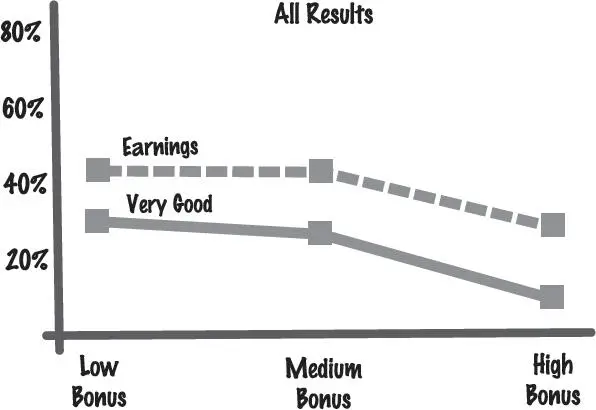The graph below summarizes the results for the three bonus conditions across the six games. The “very good” line represents the percentage of people in each condition who achieved this level of performance. The “earnings” line represents the percentage of total payoff that people in each condition earned.

Supersizing the Incentive
I should probably tell you now that we didn’t start out running our experiments in the way I just described. Initially, we set about to place some extra stress on our participants. Given our limited research budget, we wanted to create the strongest incentive we could with the fixed amount of money we had. We chose to do this by adding the force of loss aversion to the mix. * Loss aversion is the simple idea that the misery produced by losing something that we feel is ours—say, money—outweighs the happiness of gaining the same amount of money. For example, think about how happy you would be if one day you discovered that due to a very lucky investment, your portfolio had increased by 5 percent. Contrast that fortunate feeling to the misery that you would feel if, on another day, you discovered that due to a very unlucky investment, your portfolio had decreased by 5 percent. If your unhappiness with the loss would be higher than the happiness with the gain, you are susceptible to loss aversion. (Don’t worry; most of us are.)
To introduce loss aversion into our experiment, we prepaid participants in the small-bonus condition 24 rupees (6 times 4). Participants in the medium-bonus condition received 240 rupees (6 times 40), and participants in the very-large-bonus condition were prepaid 2,400 rupees (6 times 400). We told them that if they got to the very good level of performance, we would let them keep all of the payment for that game; if they got to the good level of performance, we would take back half of the amount per game; and if they did not even reach the good level of performance, we would take back the entire amount per game. We thought that our participants would feel more motivated to avoid losing the money than they would by just trying to earn it.
Ramesh carried out this version of the experiment in a different village with two participants. But he went no further because this approach presented us with a unique experimental challenge. When the first participant stepped into the community center, we gave him all the money he could conceivably make from the experiment—2,400 rupees, equivalent to about five months’ salary—in advance. He didn’t manage to do any task well, and, unfortunately for him, he had to return all the money. At that point we looked forward to seeing if the rest of the participants would exhibit a similar pattern. Lo and behold, the next participant couldn’t manage any of the tasks either. The poor fellow was so nervous that he shook the whole time and couldn’t concentrate. But this guy did not play according to our rules, and at the end of the session he ran away with all of our money. Ramesh didn’t have the heart to chase him. After all, who could blame the poor guy? This incident made us realize that including loss aversion might not work in this experiment, so we switched to paying people at the end.
There was another reason why we wanted to prepay participants: we wanted to try to capture the psychological reality of bonuses in the marketplace. We thought that paying up front was analogous to the way many professionals think about their expected bonuses every year. They come to think of the bonuses as largely given and as a standard part of their compensation. They often even make plans for spending it. Perhaps they eye a new house with a mortgage that would otherwise be out of reach or plan a trip around the world. Once they start making such plans, I suspect that they might be in the same loss aversion mind-set as the prepaid participants.
We were certain that there would be some limits to the negative effect of high reward on performance—after all, it seemed unlikely that a significant bonus would reduce performance in all situations. And it seemed natural to expect that one limiting factor (what psychologists call a “moderator”) would depend on the level of mental effort the task required. The more cognitive skill involved, we thought, the more likely that very high incentives would backfire. We also thought that higher rewards would more likely lead to higher performance when it came to noncognitive, mechanical tasks. For example, what if I were to pay you for every time you jump in the next twenty-four hours? Wouldn’t you jump a lot, and wouldn’t you jump more if the payment were higher? Would you reduce your jumping speed or stop while you still had the ability to keep going if the amount were very large? Unlikely. In cases where the tasks are very simple and mechanical, it’s hard to imagine that very high motivation would backfire.
This reasoning is why we included a wide range of tasks in the experiment and why we were somewhat surprised that the very high reward level resulted in lower performance on all our tasks. We had certainly expected this to be the case for the more cognitive tasks such as the Simon and Recall Last Three Numbers games, but we hadn’t expected the effect to be just as pronounced for the tasks that were more mechanical in nature, such as the Dart Ball and Roll-up games. How could this be? One possibility was that our intuition about mechanical tasks was wrong and that, even for those kinds of tasks, very high incentives can be counterproductive. Another possibility was that the tasks that we considered as having a low cognitive component (Dart Ball and Roll-up) still required some mental skill and we needed to include purely mechanical tasks in the experiment.
With these questions in mind, we next set out to see what would happen if we took one task that required some cognitive skills (in the form of simple math problems) and compared it to a task that was based on pure effort (quickly clicking on two keyboard keys). Working with MIT students, we wanted to examine the relationship between bonus size and performance when the task was purely mechanical, as opposed to a task that required some mental ability. Given my limited research budget, we could not offer the students the same range of bonuses we had offered in India. So we waited until the end of the semester, when the students were relatively broke, and offered them a bonus of $660—enough money to host a few parties—for a task that would take about twenty minutes.
Our experimental design had four parts, and each participant took part in all four of them (this setup is what social scientists call a within-participant design). We asked the students to perform the cognitive task (simple math problems) twice: once with the promise of a low bonus and once with the promise of a high bonus. We also asked them to perform the mechanical task (clicking on a keyboard) twice: once with the promise of a low bonus and once with the promise of a high bonus.
What did this experiment teach us? As you might expect, we saw a difference between the effects of large incentives on the two types of tasks. When the job at hand involved only clicking two keys on a keyboard, higher bonuses led to higher performance. However, once the task required even some rudimentary cognitive skills (in the form of simple math problems), the higher incentives led to a negative effect on performance, just as we had seen in the experiment in India.
The conclusion was clear: paying people high bonuses can result in high performance when it comes to simple mechanical tasks, but the opposite can happen when you ask them to use their brains—which is usually what companies try to do when they pay executives very high bonuses. If senior vice presidents were paid to lay bricks, motivating them through high bonuses would make sense. But people who receive bonus-based incentives for thinking about mergers and acquisitions or coming up with complicated financial instruments could be far less effective than we tend to think—and there may even be negative consequences to really large bonuses.
Читать дальше












